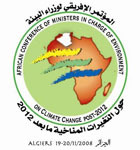Ministers of Environment and other high-level representatives from 45 African countries, agreed to accelerate action on the 2030 Agenda for Sustainable Development, the Paris Agreement on Climate Change and the prevention of illegal trade in wildlife at the Sixth Special Session of the African Ministerial Conference on the Environment (AMCEN).
Participants also finalized a set of resolutions reflecting the region's priorities to be tabled at the second session of the United Nations Environment Assembly (UNEA-2) of the UN Environment Programme (UNEP) in May 2016.
 19 April 2016: Ministers of Environment and other high-level representatives from 45 African countries agreed to accelerate action on the 2030 Agenda for Sustainable Development, the Paris Agreement on Climate Change and the prevention of illegal trade in wildlife at the Sixth Special Session of the African Ministerial Conference on the Environment (AMCEN). Participants also finalized a set of resolutions reflecting the region’s priorities to be tabled at the second session of the UN Environment Assembly (UNEA-2) of the UN Environment Programme (UNEP) in May 2016.
19 April 2016: Ministers of Environment and other high-level representatives from 45 African countries agreed to accelerate action on the 2030 Agenda for Sustainable Development, the Paris Agreement on Climate Change and the prevention of illegal trade in wildlife at the Sixth Special Session of the African Ministerial Conference on the Environment (AMCEN). Participants also finalized a set of resolutions reflecting the region’s priorities to be tabled at the second session of the UN Environment Assembly (UNEA-2) of the UN Environment Programme (UNEP) in May 2016.
The Sixth Special Session of AMCEN convened from 16-19 April in Cairo, Egypt, under the theme, ‘Agenda 2030 and Paris Agreement: From policy to implementation in Africa.’
Ministers agreed to put in place policies and practices to support implementation of the 2030 Agenda, the Sustainable Development Goals (SDGs) and the African Union’s (AU) Agenda 2063 and its first ten-year implementation plan. These policies included plans to reverse ecosystem degradation, as called for in SDG 15 (to protect, restore and promote sustainable use of terrestrial ecosystems, sustainably manage forests, combat desertification and halt and reverse land degradation and halt biodiversity loss) and to promote sustainable consumption and production (SCP) patterns, as addressed in SDG 12 (to ensure SCP patterns). Participants also supported creating and strengthening public-private partnerships and establishing centers focused on harnessing sustainable natural capital, green industries, agro-processing centers and value addition.
Adaptation to climate change remains the highest priority for Africa, participants stressed, saying there is an urgent need for immediate, adequate support to implement adaptation measures in Africa. They welcomed the adoption of the Paris Agreement, observing that it accommodated many African concerns and interests, while stressing the necessity of developed countries to adhere to and fulfill their commitments in the pre-2020 period. Commenting on the discussion, AMCEN President Khaled Fahmy (Egypt) said that participants “stressed the need for African countries to continue engaging actively in climate change negotiations, in order to provide further guidance, and identify the modalities and rules regarding the implementation of the Agreement.”
Among specific commitments to tackle illegal wildlife trade, Maria de Fatima Jardim, Minister of Environment for Angola – one of the largest domestic ivory markets in the world – highlighted a recent decree banning the sale of ivory and ivory artifacts in Angola, with the deployment of a wildlife crime unit at the country’s international airport in Luanda. Angola will host a global observance of World Environment Day on 5 June 2016 that will focus on mobilizing global action to tackle illegal trade in wildlife. In addition, AMCEN agreed to support the AU Strategy on Combating Illegal Exploitation and Illegal Trade in Wild Flora and Fauna and to facilitate implementation of its action plan, as a move towards a common, coordinated response. They further committed to provide leadership to establish inter-agency task forces with government, intergovernmental and non-governmental partners.
AMCEN also requested member States to develop a Strategic Framework for Drought Management and Actions to Enhance Resilience to Drought and Develop Early Warning Systems for African Countries and to support the UN Convention to Combat Desertification (UNCCD) programme on land degradation neutrality (LDN). In its final outcome, AMCEN welcomed the progress made in establishing the Africa Renewable Energy Initiative (AREI) and the Africa Adaptation Initiative (AAI), and called for their swift implementation.
To ensure that UNEA-2 addresses Africa’s regional and national priorities, participants agreed to engage with a common approach. According to UNEP, African countries are expected to table a set of resolutions at UNEA, including on illegal trade in wildlife, natural capital, and health and the environment, with a focus on lead battery recycling. Stressing an “urgent need to reconcile social, economic and environmental interests regionally, nationally and locally,” UNEP Deputy Executive Director Ibrahim Thiaw welcomed AMCEN’s decisions, saying they “demonstrate that Africa’s leaders are committed to both the 2030 Agenda and the Paris Agreement as a means of building a sustainable future for every citizen on this diverse continent.” [UNEP Press Release on Outcomes of 6th Special Session of AMCEN] [UNEP Press Release on Illegal Wildlife Trade discussions at AMCEN] [AMCEN 6th Special Session Website] [UNEA-2 Website] [IISD RS Story on Outcomes of UNEP OECPR2 in February 2016] [IISD RS Coverage of UNEP OECPR2 in February 2016] [UNEP Deputy Executive Director Statement] [SDGs Website]